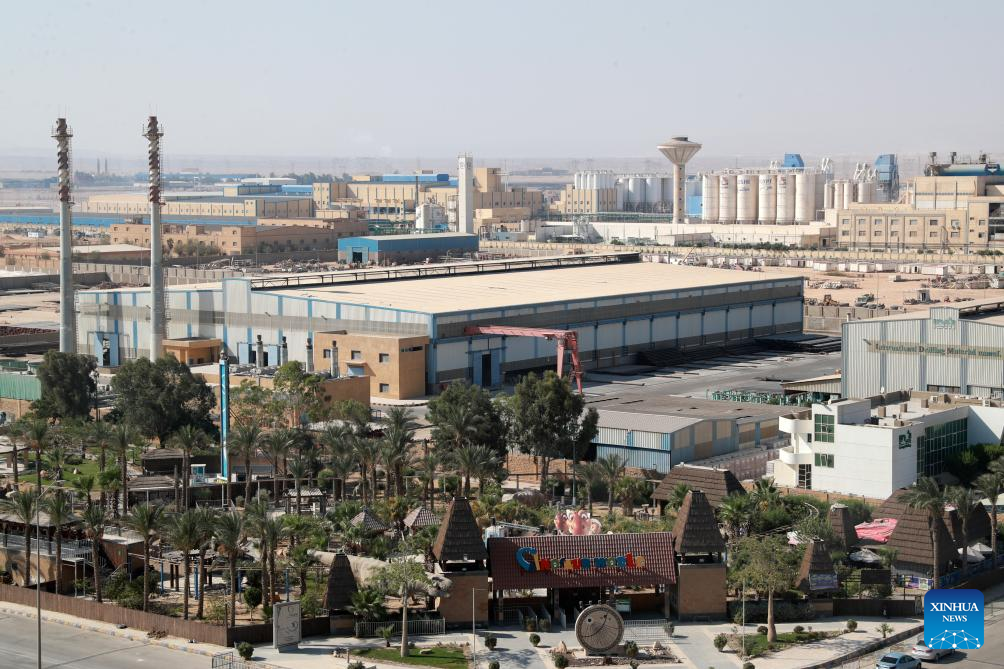
This photo taken on Aug. 10, 2023 shows a view of the China-Egypt TEDA Suez Economic and Trade Cooperation Zone in Suez province, Egypt. (Xinhua/Sui Xiankai)
TIANJIN/CAIRO, Aug. 21 (Xinhua) -- "From the Bohai Bay to the Red Sea, we measure the 15,000-li-long (7,500-km-long) march of our career with youth," reads a line on the front page of a manual of China-Africa TEDA Investment Co., Ltd.
Thanks to the care of the heads of state of China and Egypt, the China-Egypt TEDA Suez Economic and Trade Cooperation Zone (SETC-Zone) has gradually become a demonstration project that aligns the China-proposed Belt and Road Initiative (BRI) with the development of the Suez Canal Corridor.
Not long ago, the SETC-Zone celebrated its 15th birthday. Xinhua reporters once again visited industrial developer TEDA's headquarters in Tianjin, China and the Suez Canal Economic Zone (SCZone) in Egypt to figure out how a cooperation zone in the desert became a bridge of common development and win-win cooperation between the two countries.
A DESERT MIRACLE
In the mid-1990s, Egypt was impressed by the blossoming of China's development zones and solicited China's assistance in establishing a development zone in Suez.
The Suez area, mostly covered by desert, is located in the northeastern part of Egypt and on the north coast of the Red Sea, and is some 120 km away from the capital city of Cairo.
Its geographical location and geological environment are very similar to TEDA -- Tianjin Economic-Technological Development Area, situated about 150 km to the east of China's capital city Beijing with the Bohai Sea to its east.
In 1998, the State Council, China's cabinet, assigned TEDA to undertake this project, said Qu Defu, chairman of TEDA Investment Holdings Co., Ltd. "In fact, it was replicating Tianjin's 'TEDA model' in the Suez area, and it became a national mission of 'TEDA people,'" said Qu.
In recent years, China-Africa TEDA Investment Co., Ltd., which was jointly established by TEDA Investment Holdings Co., Ltd. and China-Africa Development Fund, opened a new chapter with the construction of the SETC-Zone.
In 2008, the first-phase construction of the SETC-Zone kicked off on an area of 1.34 square km. In 2016, heads of state of China and Egypt unveiled the second-phase of the project, which covers an area of 6 square km.
Over the past 15 years, the cooperation zone has attracted 145 companies to settle in and an investment of more than 1.7 billion U.S. dollars. With sales revenues exceeding 3.8 billion dollars, the businesses in the zone have provided about 5,000 direct jobs and 50,000 employment opportunities in related industries.
Besides office buildings and production lines, supporting facilities such as star-rated hotels and amusement parks have been built.
Ahmad Abdel Baqy, an engineering administrator in the zone, told Xinhua that he and his Chinese colleagues "built the cooperation zone into a beautiful city."
LONG ROOTS LIKE DESERT PLANT
On Jan. 21, 2016, the leaders of the two countries jointly unveiled the second phase of the China-Egypt SETC-Zone. That was the highlight for the "TEDA people," who regard investor-orientation as a priority, and uphold the spirit of the desert plant "Alhagi sparsifolia."
"Alhagi sparsifolia is a low-growing shrub in Egypt. It does not 'drink' a drop of water all the year, even under high temperatures, and its root can reach as long as 40 to 50 meters. It's like our striving journey here," said Wei Jianqing, deputy general manager of China-Africa TEDA Investment Co., Ltd.
The company helped cultivate the industrial chain in Egypt according to local conditions based on production capacity cooperation, Wei added.
"For me and most Egyptians and even people in other Middle Eastern countries, fiberglass manufacturing was an entirely unfamiliar term," recalled Ahmed Soliman, deputy general manager of Jushi Egypt Fiberglass Co., Ltd.
The cooperation zone supported Chinese enterprise Jushi to establish a subsidiary company in Egypt, which has enabled the Egyptian fiberglass industry to grow from scratch and made Egypt a major fiberglass producer in the world. What's even more commendable is that the company bolstered the seawater desalination project since the beginning of its design in order to solve the water problem.
At present, the cooperation zone has attracted many Chinese-funded enterprises such as Jushi, XD-EGEMAC, and Midea, as well as enterprises from Egypt, the United Arab Emirates, Canada and other countries.
The first-phase construction has been completed, featuring four leading industries, i.e. new building materials, petroleum equipment, high and low voltage equipment, and machinery manufacturing. In the second phase of the project, some 40 companies have settled in, attracting over 300 million dollars of investment.
Meanwhile, the cooperation zone is continuously upgrading from "industrial cluster" to "industry-business collaboration" center. Since 2021, it has successfully promoted the official operation of the first Chinese-funded TEDA-Royal Bonded Warehouse project in Egypt. Besides, it has focused on building an international commodity distribution center, and an automobile and accessories distribution center.
"Even in the three years of COVID-19, 90 percent of enterprises in the zone gained profits. This is the most fulfilling achievement for us as a cooperation platform," said Liu Aimin, chairman of China-Africa TEDA Investment Co. Ltd.
GROWING LIKE AN "ACACIA TREE"
Last month, the SETC-Zone held a 15th anniversary celebration, which also highlighted its "strategic upgrade." Wang Linqiang, employee of TEDA Investment Holdings Co., Ltd., who participated in the event, added a little sense of ceremony to his first trip to Egypt.
From the Cairo International Airport to the cooperation zone, there was vast desolate desert along the way. Together with the bustling cooperation zone, there was also a tall acacia tree that caught his eye.
"It takes many years for an acacia tree to grow from a seed to a tree. I heard from my colleagues that this tree has been here for decades, just like our zone, growing tall and straight," Wang said, pouring two buckets of water on it, honoring the dedication of everyone in China and Egypt to the cooperation zone.
Nahla Emad, 39, is now the CEO of the Egypt-TEDA SCZone Development Company. She said that the cooperation zone has arranged five trainings for her in China, where she learned the basics of an economic and trade cooperation zone, how to formulate an overall plan, how to build and operate the cooperation zone, how to do marketing and so on, giving her great room for growth.
Liu said the proportion of local employees in the cooperation zone has reached 90 percent, of which one-fifth are women.
At the same time, the "TEDA Overseas Model," which is based on the model of TEDA, combined with the experience of the China-Egypt SETC-Zone, has been applied to more than a dozen overseas projects along the Belt and Road through consulting services.
On the new starting point as the cooperation zone marks its 15th anniversary, the "Teda Cooperation Zone 2030 Vision -- Strategic Upgrade Plan" was released, which will further promote the three major projects of industrial agglomeration capacity improvement, industrial service capacity improvement, and industrial supporting capacity improvement, offering better support to Belt and Road cooperation.
SCZone Chairman Waleid Gamaleldien said that the TEDA cooperation zone is located in the hub of Asian, African and European continents, and is an important project for the BRI. With its unique strategic position, he is optimistic about the future of the cooperation zone in the next 15 years, and will be happy to see it become a stellar example of China-Egypt cooperation.
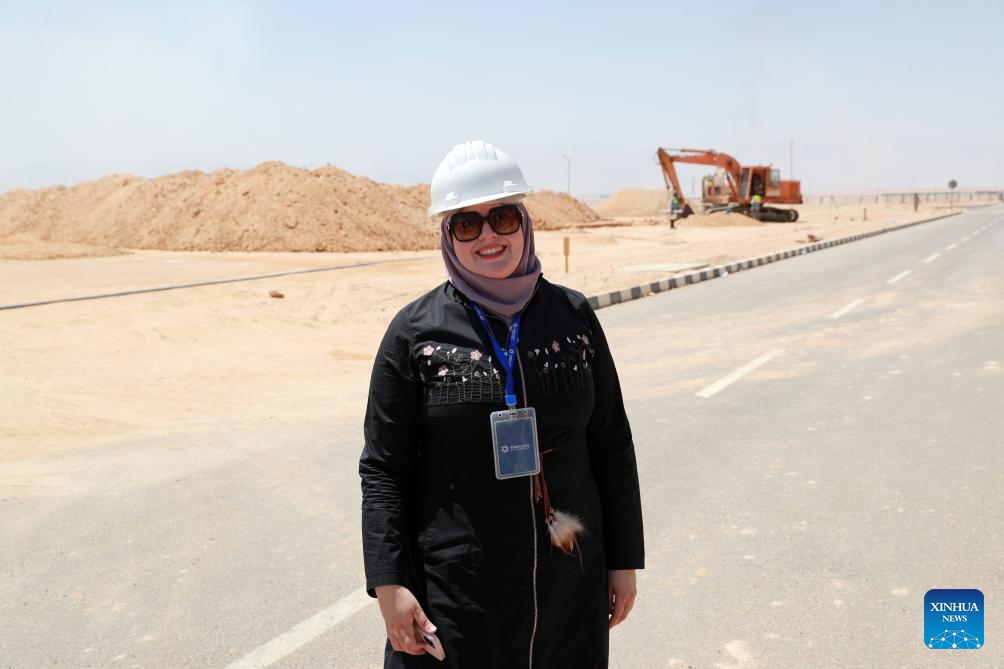
Nahla Emad, CEO of the Egypt-TEDA Suez Canal Economic Zone (SCZone) Development Company, is pictured at the China-Egypt TEDA Suez Economic and Trade Cooperation Zone in Suez province, Egypt, Aug. 10, 2023. (Xinhua/Sui Xiankai)
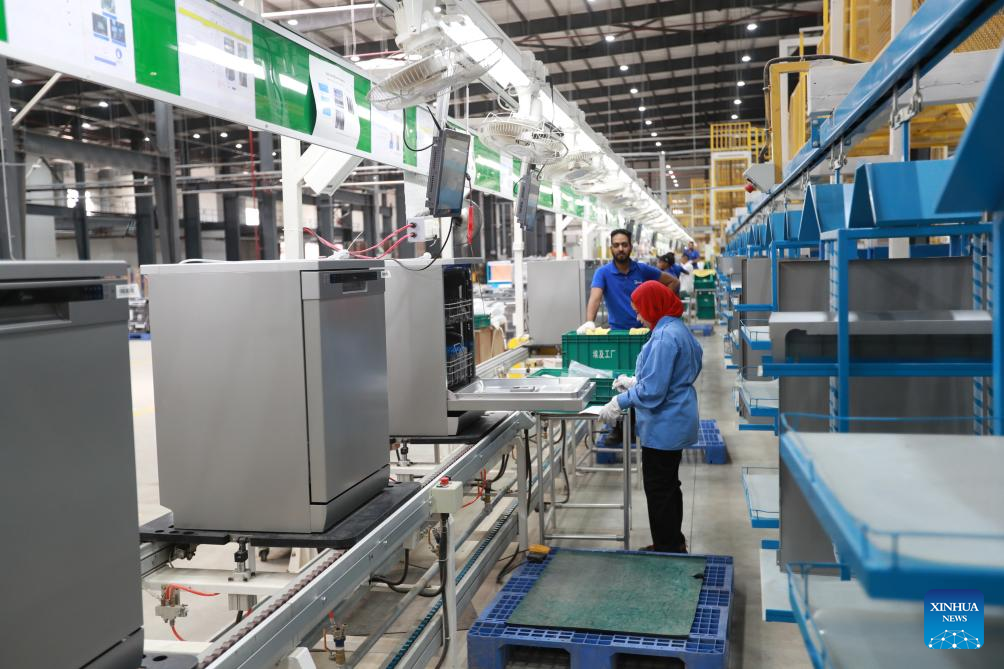
Workers operate on the dishwasher production line of Midea (Egypt) Kitchen & Water Heater Appliances Co., Ltd. at the China-Egypt TEDA Suez Economic and Trade Cooperation Zone in Suez province, Egypt, Aug. 10, 2023. (Xinhua/Sui Xiankai)
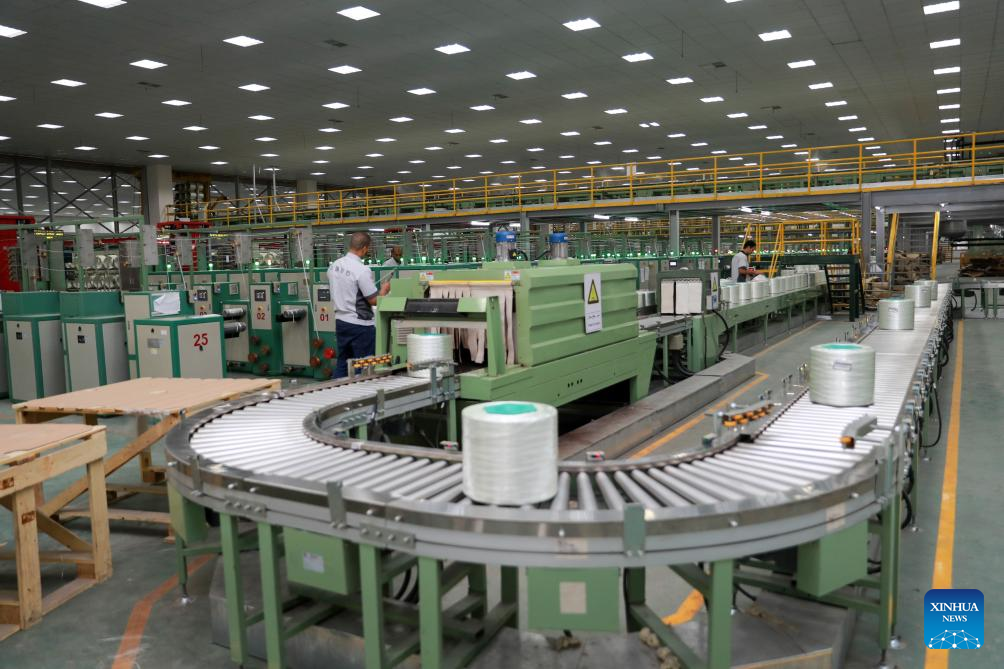
Workers operate on the fiberglass production line of Jushi Egypt Fiberglass Co., Ltd. at the China-Egypt TEDA Suez Economic and Trade Cooperation Zone in Suez province, Egypt, Aug. 10, 2023. (Xinhua/Sui Xiankai)
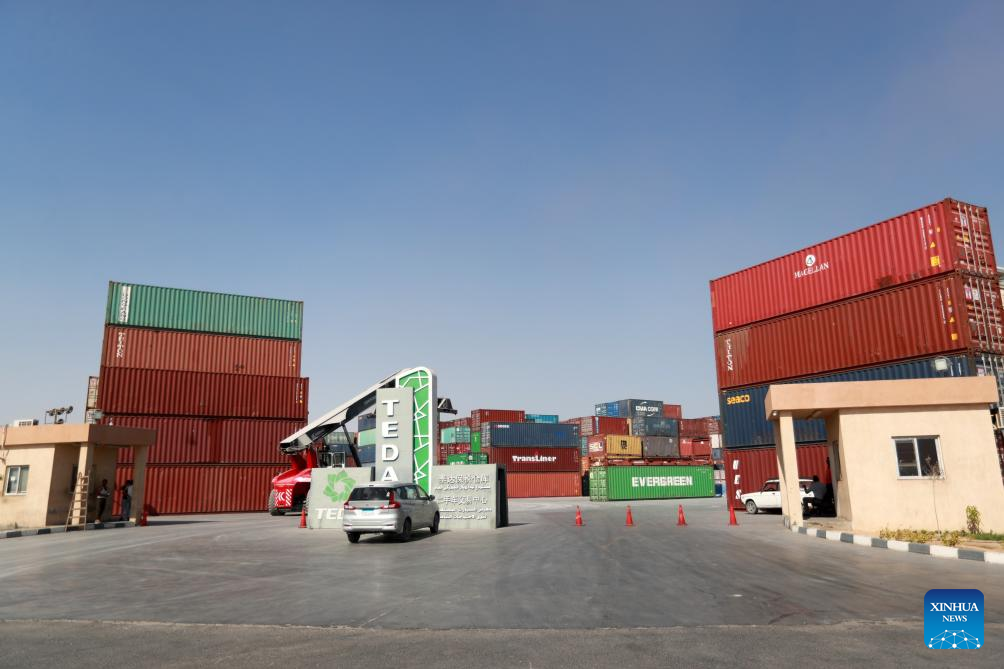
This photo taken on Aug. 10, 2023 shows the bonded warehouse and second-hand car trading center at the China-Egypt TEDA Suez Economic and Trade Cooperation Zone in Suez province, Egypt. (Xinhua/Sui Xiankai)
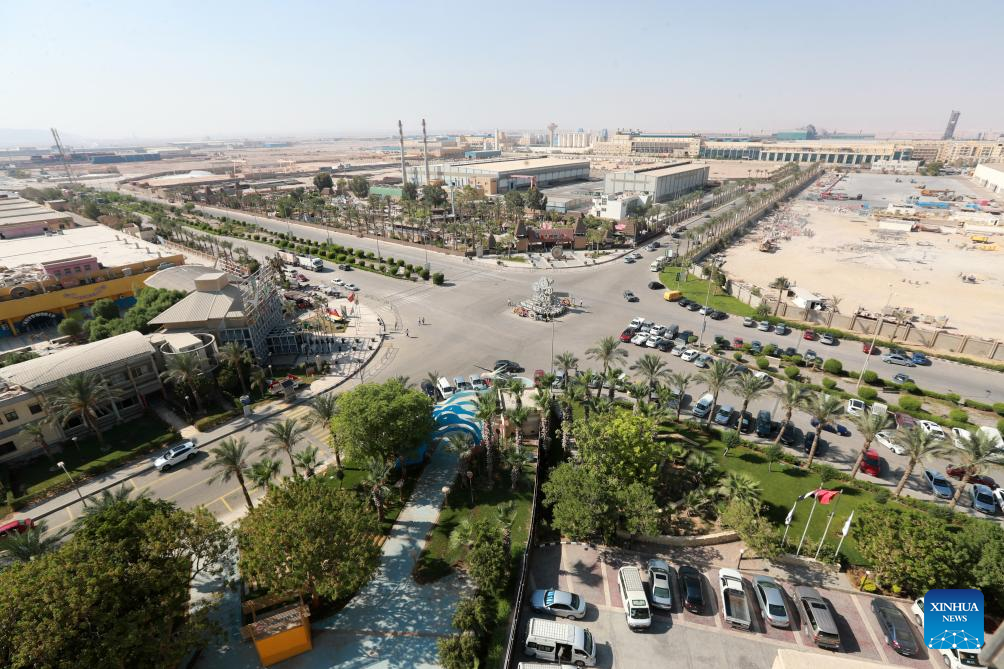
This photo taken on Aug. 10, 2023 shows a view of the China-Egypt TEDA Suez Economic and Trade Cooperation Zone in Suez province, Egypt. (Xinhua/Sui Xiankai)
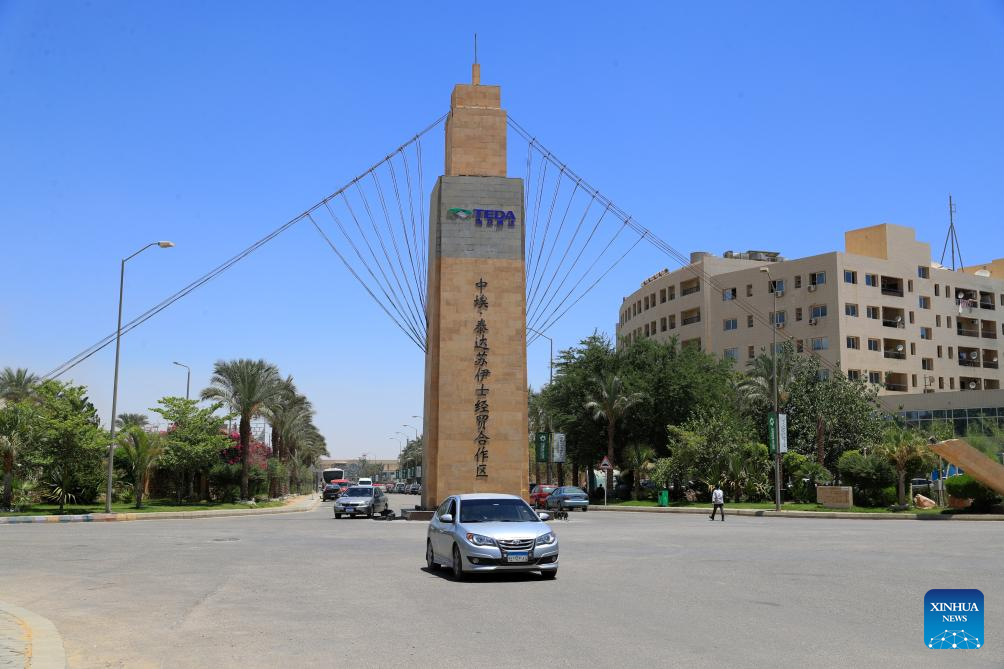
This photo taken on July 19, 2023 shows the gate for the China-Egypt TEDA Suez Economic and Trade Cooperation Zone in Suez province, Egypt. (Xinhua/Sui Xiankai)
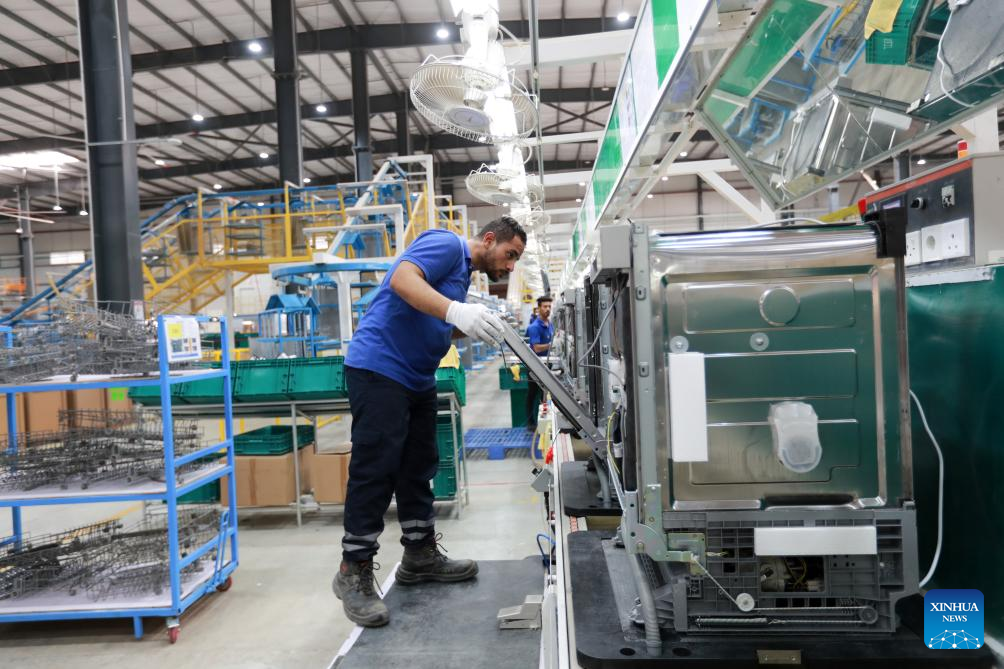
Workers work on the dishwasher production line of Midea (Egypt) Kitchen & Water Heater Appliances Co., Ltd. at the China-Egypt TEDA Suez Economic and Trade Cooperation Zone in Suez province, Egypt, Aug. 10, 2023. (Xinhua/Sui Xiankai)
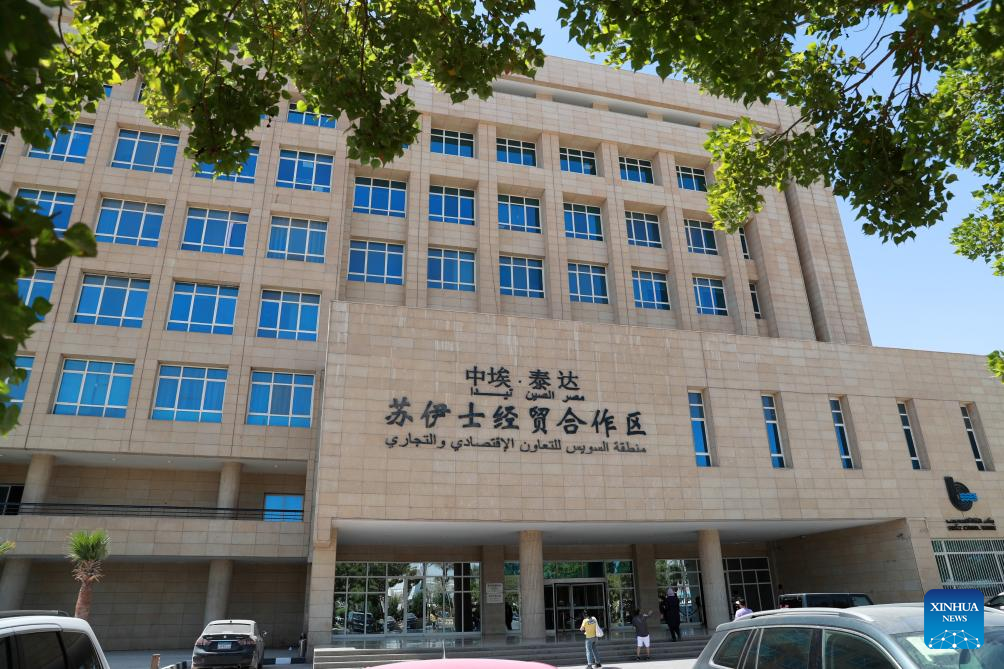
This photo taken on Aug. 10, 2023 shows an office building of the China-Egypt TEDA Suez Economic and Trade Cooperation Zone in Suez province, Egypt. (Xinhua/Sui Xiankai)
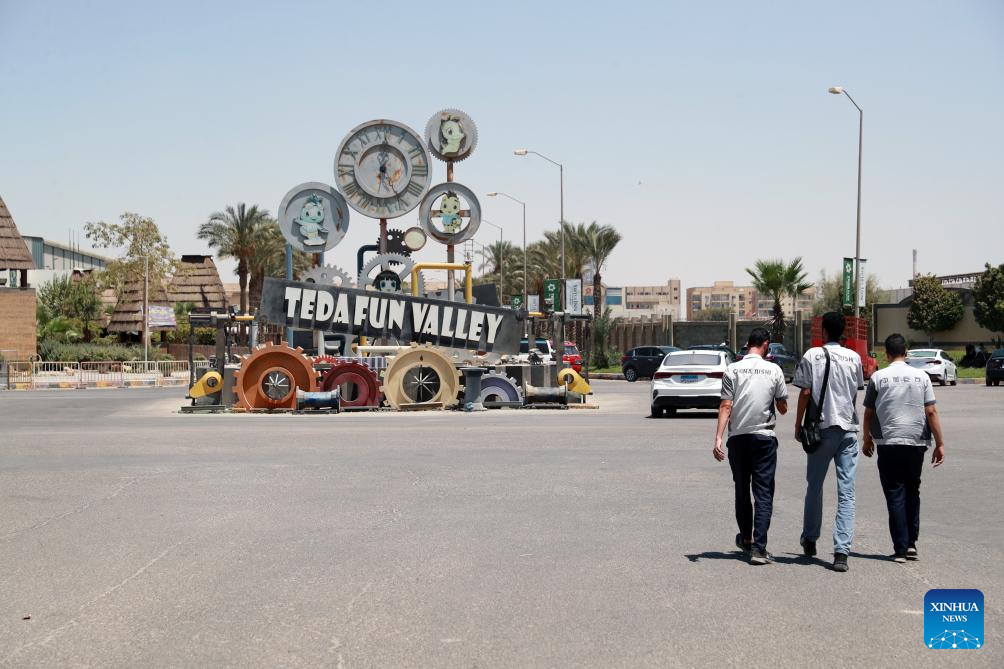
This photo taken on Aug. 10, 2023 shows a view of the China-Egypt TEDA Suez Economic and Trade Cooperation Zone in Suez province, Egypt. (Xinhua/Sui Xiankai)
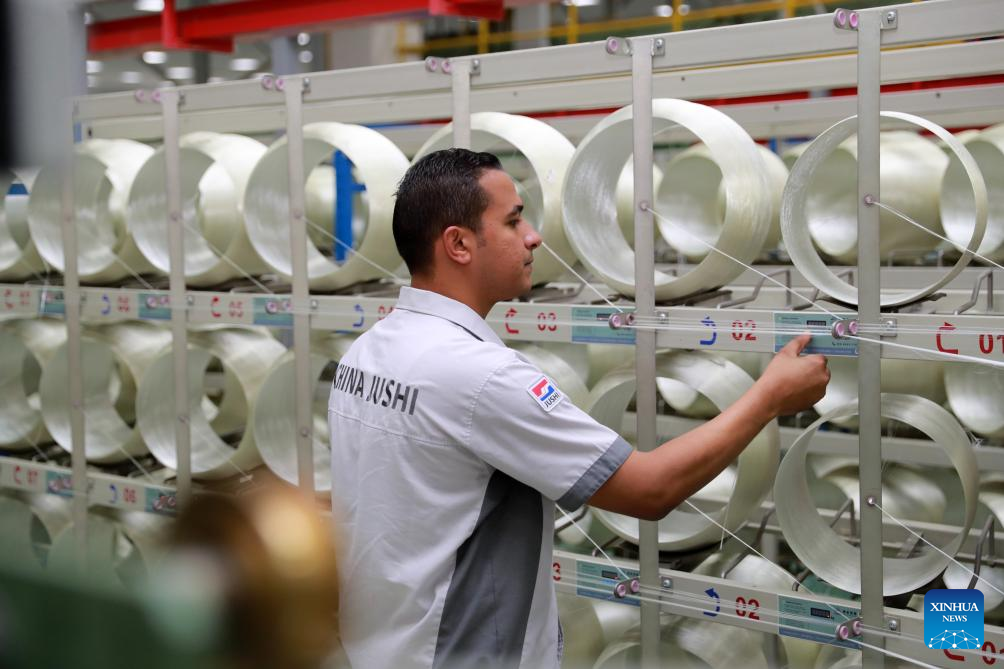
Ahmed Soliman, deputy general manager of Jushi Egypt Fiberglass Co., Ltd., checks on the fiberglass production line of Jushi Egypt at the China-Egypt TEDA Suez Economic and Trade Cooperation Zone in Suez province, Egypt, Aug. 10, 2023. (Xinhua/Sui Xiankai)




 A single purchase
A single purchase









